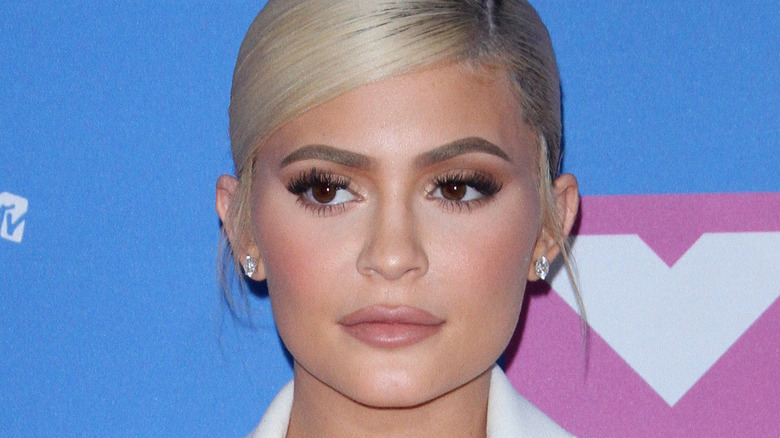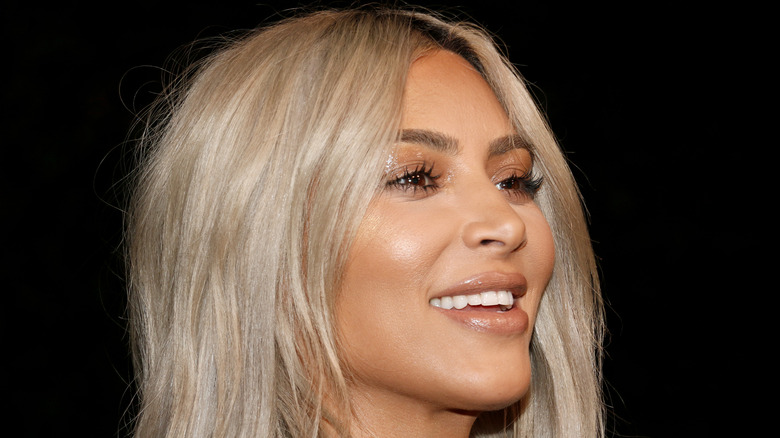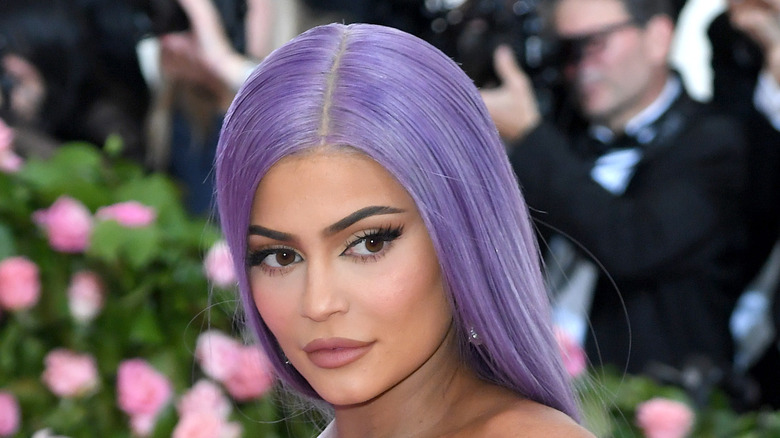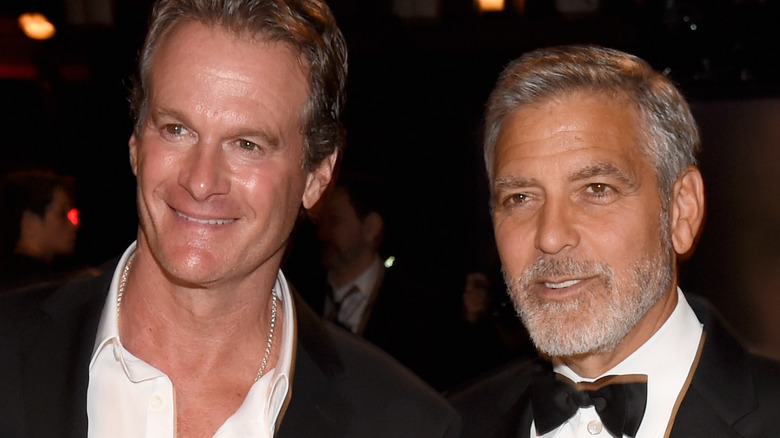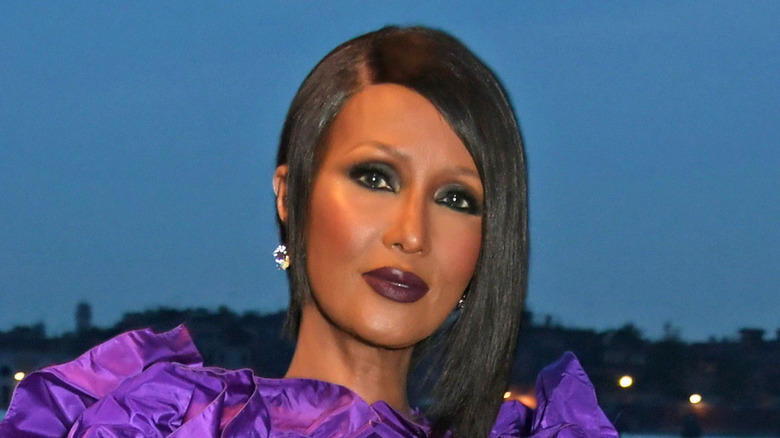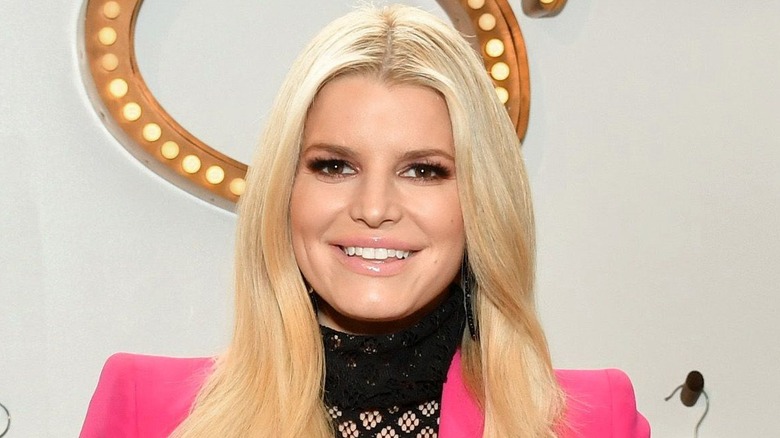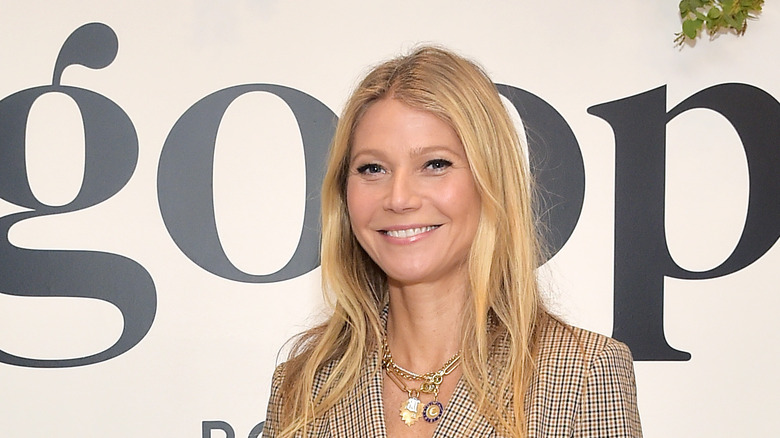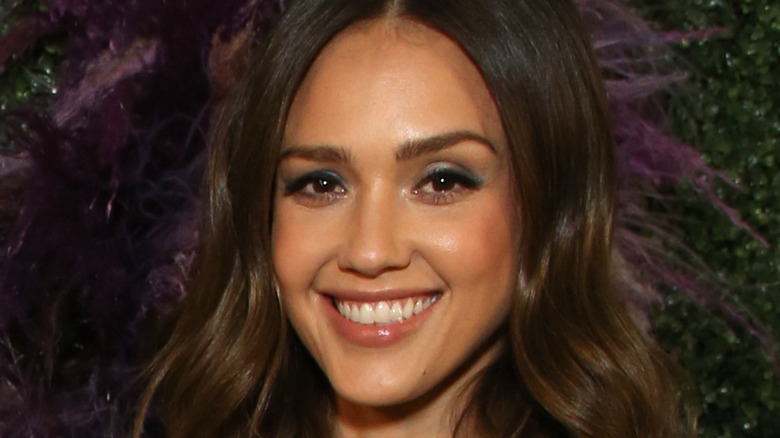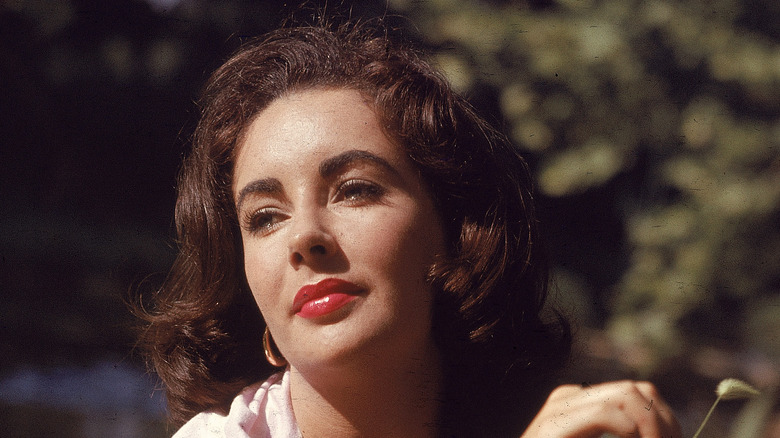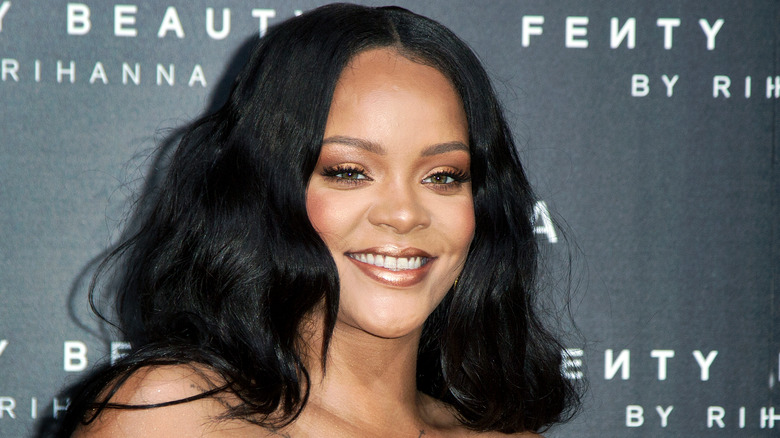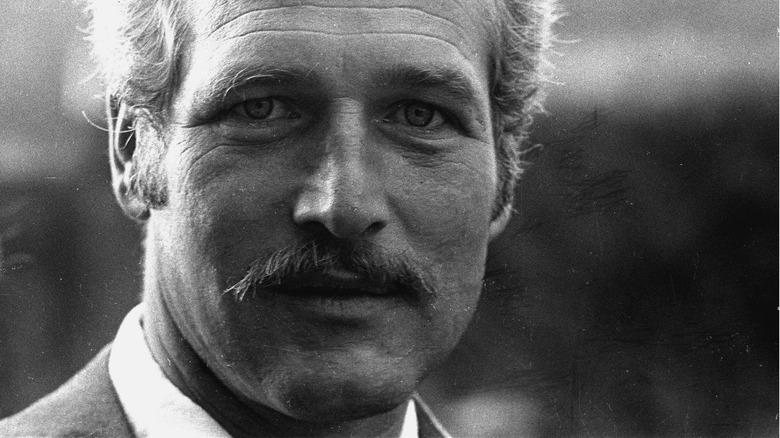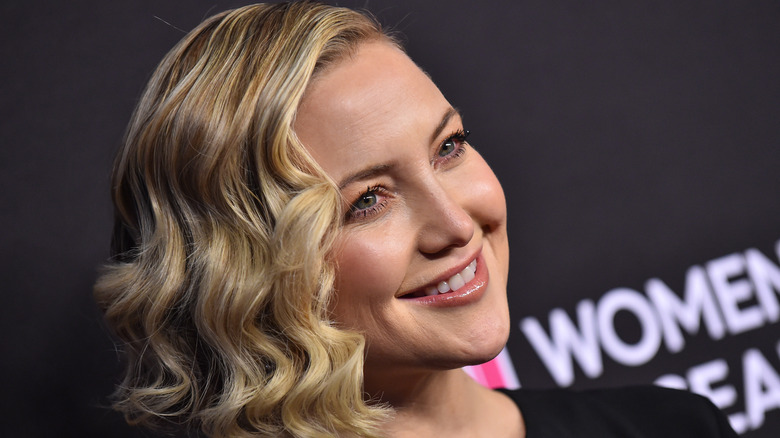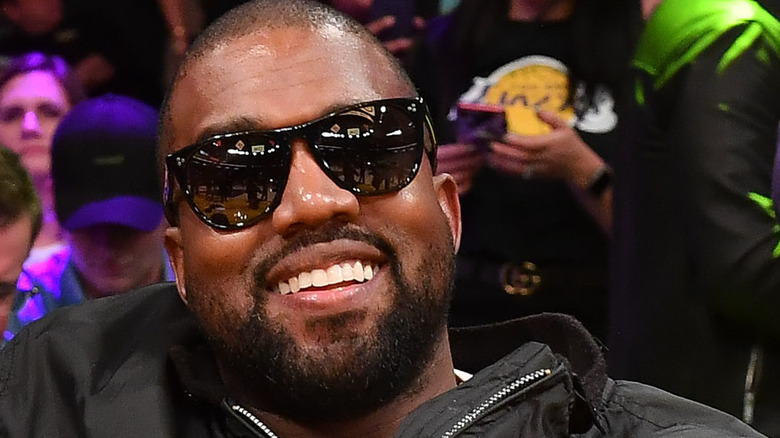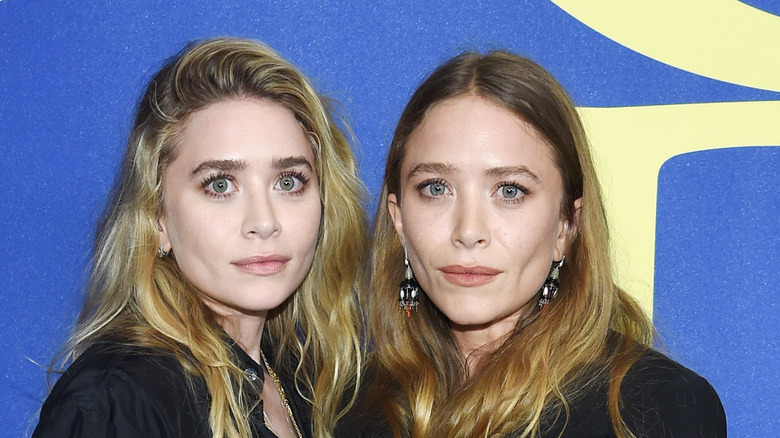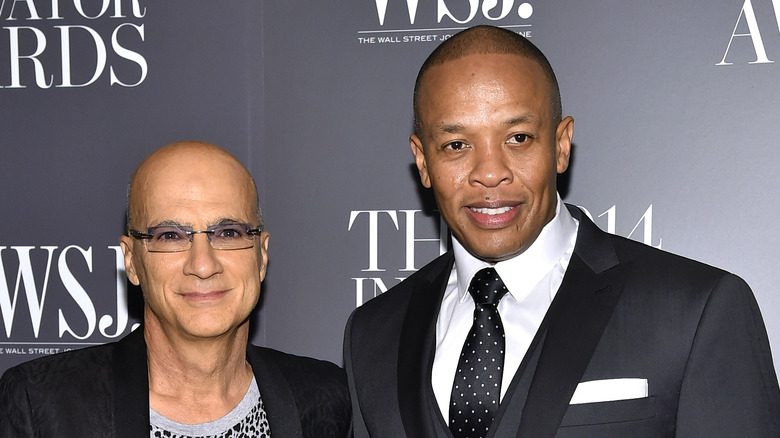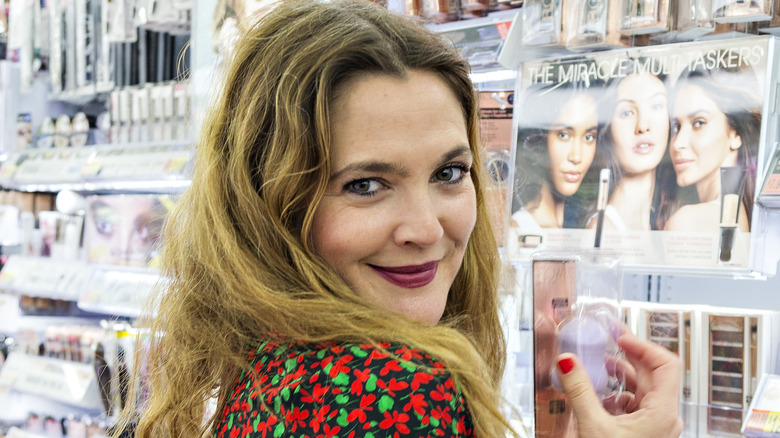These Are The Most Successful Celebrity Brands
In Hollywood, as in business, great minds think alike. "I always wanted to have a fragrance," screen legend Elizabeth Taylor told Kim Kardashian for Harper's Bazaar in 2011. "And I always wanted to be able to connect with people in ways other than through film." When Taylor launched her first perfume in 1987, she didn't just fulfill a life-long dream. She also paved the way for the modern celebrity brand bonanza.
Though Taylor was the first famous face to build a business empire based on herself as the muse, she certainly wasn't the last. From kitchen appliances and shapewear to lip kits and lots and lots of signature scents, if you're in the market for something new, odds are you'll be able to find a celebrity-branded version of what you're looking for. Today, it's a multibillion-dollar industry and, according to Forbes, may be the future of retail.
Ready to shop? Here's a look at the most successful celebrity brands.
Kim Kardashian's Skims is a booming business
Kim Kardashian fangirled out when she interviewed Elizabeth Taylor for Harper's Bazaar in 2011. "You are my idol," she told Taylor. "I am a huge Elizabeth Taylor nerd." In addition to the gems and iconic looks, Kardashian seems to have drawn business inspiration from the legendary star and fragrance pioneer.
From fragrances and forays into beauty and fashion with her famous siblings, Kardashian has become a reality star turned global business magnate with KKW Beauty and Skims. Launched in 2019 after a delay and renaming due to concerns of cultural appropriation, Skims came about because Kardashian "wanted shapewear that would allow me to wear amazing fashion pieces comfortably," she told Nordstrom to celebrate its debut in their stores. To the hugely popular line of uniquely cut shapewear pieces in a range of shades, the brand added loungewear separates in luxe fabrics and tapped into the work-from-home market stemming from the coronavirus pandemic. In the spring of 2021, Kardashian announced (via The New York Times) the valuation of Skims: $1.6 billion.
With KKW Beauty undergoing a rebrand (after she sold a minority stake in it to Coty), Kardashian is keeping her entrepreneurial eye focused on what her fans want, as she shared on Twitter in 2019: "What's made it possible for me after all of these years has been the direct line of communication with my fans and the public."
Kylie Cosmetics made Kylie Jenner a billionaire... or did it?
Growing up on "Keeping Up With the Kardashians" gave Kylie Jenner a lot of fans and a lot of reach — and she leveraged both into a wildly successful business. Through social media, Kylie capitalized on the interest her fans had in her overly lined lips. In 2015, at age 17, she launched Kylie Cosmetics with a first batch of 15,000 lip kits. Per The Hollywood Reporter, inventory sold out in less than an hour, crashing the website, and a new celebrity empire was born.
Kylie's interest in all things beauty runs deeper. In the first episode of "Inside Kylie Cosmetics" on YouTube in 2021, she shared, "I've loved [makeup] for as long as I can remember. Kendall [Jenner] was riding horses, and I was, like, practicing my makeup at home."
The "amazing" connection afforded by social media hasn't been lost on the beauty mogul, or the industry. In 2019, Forbes declared Kylie Jenner the youngest self-made billionaire ever, thanks in part to her selling a majority stake in the business to Coty. The magazine later walked back their estimate, to $900 million, citing inflated numbers coming from the Kardashian-Jenner camp.
Whether a billionaire or just a multimillionaire, Kylie Jenner is continuing to expand her cosmetics line and other ventures. Kylie Skin launched in 2019, and in the third episode of her 2021 YouTube series, with baby Stormi toddling around, she teased her latest genius idea: Kylie Baby.
George Clooney and Rande Gerber started Casamigos to avoid hangovers
A night out drinking with a friend might not produce a billion-dollar idea for everyone, but it did for George Clooney and Rande Gerber. On a trip to Mexico, the long-time friends were imbibing one night when, according to Gerber, the nightlife entrepreneur and husband of Cindy Crawford, Clooney had a lightbulb moment. "We would drink a lot of tequila," Gerber told Business Insider in 2017. "George turned to me and said, 'Why don't we create one that's perfect for us?' We wanted one ... we could drink all day long and not be hungover in the morning."
In the summer of 2017, the company announced they sold for $1 billion. The sale made the Oscar winner the highest-paid actor of 2018, according to Forbes, despite not appearing in a movie that year. Talking about the windfall to CNBC in 2017, Clooney joked, "If you asked us four years ago if we had a billion-dollar company, I don't think we would have said yes ... We'll still be very much a part of Casamigos. Starting with a shot tonight. Maybe two."
Gerber and Clooney got the name "Casamigos" (Spanish for "house of friends") from the name of the property they were staying at that fateful night. When promoting the brand, the two keep it just as friendly and fun, like they did in a 2018 Instagram photo timed for Halloween that Crawford shared: Her husband and Clooney are pilots, and she's the sexy flight attendant welcoming fans aboard "Casamigos Air."
Iman's beauty line was the first to offer shades to match all skin tones
Necessity being the mother of invention was certainly true for legendary supermodel Iman. "The very first makeup artist on my first shoot did not have any foundation for my skin tone," she told Harper's Bazaar in March 2021. "I had to make my own." This led her to launch Iman Cosmetics in the early nineties. Per the company's site, it was "the first cosmetics and skincare collection designed for all women with skin of color."
For Iman, the venture was more about reflecting the diversity of the world than becoming a beauty industry pioneer. "I had a vision, which was a new way of looking at beauty," she told Harper's in January 2021. "I wanted [to create] a new language, which was multicultural, rather than about an ethnic background."
In 2007, Iman debuted a clothing and accessories line with HSN that became one of its top sellers. And as of 2010, per The New York Times, Iman Cosmetics was a $25 million a year business. Among her biggest fans was her late husband, the equally legendary David Bowie. The music icon never missed any of her beauty launches, she told Harper's in March 2021. "Whenever I would say, 'Oh, what if this fails?' — about Iman Cosmetics — he would say, 'And so what?'" she recalled. "He would always be the first person to congratulate me."
Size inclusivity and knowing her market are key to the success of Jessica Simpson Style
"Every person needs to feel included," Jessica Simpson told CBS "Sunday Morning" in 2017 about her hugely successful brand. "If I make a shirt, I'm gonna make sure every size is available. Because I have been every size, trust me."
Jessica Simpson Style, which includes clothing, accessories, shoes, and fragrances, was launched in 2005 and has gone on to be one of the most lucrative lines on the market. According to Business of Fashion, it rakes in annual sales of over $1 billion. The brand, now also offering home goods, started out exclusively at Macy's and has since expanded into other department stores and e-commerce.
The former pop star and reality show icon turned business powerhouse and author knows she's subverting expectations with her continued success. "People are shocked that they like my brand," she said to "Sunday Morning." "Maybe 'cause it's not that expensive? Or maybe because I was a cheesy pop star back in the day?"
No matter the reason, people are buying, and Simpson, who faced waves of criticism over the years for her fluctuating figure, is proud that inclusivity is a main feature of her brand. As she told InStyle in 2020, "I love the fact that people feel comfortable in my brand and confident to go into a meeting and tackle the day or to go in it with confidence."
Gwyneth Paltrow's wellness brand Goop is a trendsetter and a target
Gwyneth Paltrow knows what you might be thinking when you hear the name Goop, and she's not interested. "It's crucial to me that we remain aspirational," she told a Harvard Business School class in 2018 (via the New York Times). "Our stuff is beautiful. The ingredients are beautiful. You can't get that at a lower price point."
What started as a newsletter to friends in 2008 has grown into a $250 million wellness empire today. The brand has come a long way from offering restaurant guides and cookbooks. On Goop (a play on Paltrow's initials), you can find everything from high-end apparel and clean beauty products to guides on colorstrology, cleanses, and vibrators. As Page Six reported in 2019, packages for in-person In Goop Health summits have sold for upwards of $5,000.
Controversy has often erupted around Goop. The brand has faced legal action for promoting pseudo-scientific claims about some of the products it's sold as well as backlash over false advertising. But Paltrow is undeterred. "You can keep resisting it, but I'm on the right side of this," she told Town & Country in 2020. "I'm watching the market. I'm watching what's happening. I think what this wellness movement is really about is listening to yourself, tuning into what interests you, and trying things."
The Honest Company does a lot of good for Jessica Alba's wallet
When Jessica Alba couldn't find the natural baby products she was looking for, she saw a clear, and logical, business opportunity. Co-founded in 2011 with three other partners, Alba's The Honest Company debuted with diapers and baby products containing clean, healthy ingredients and components. For Alba, the star of movies like "Sin City" and "Fantastic Four," the company is in many ways an extension of herself.
"It's just common sense that a brand has or is aligned with the same values that you have as a person," Alba told Fortune in 2021. "I'm given this gift of life. How can I try and do good with it, and try and do my part in making the world a better place? That's really why I'm here." The transition from acting to running a multibillion-dollar business has felt "natural," Alba also said.
In 2015, The Honest Company, which has expanded to include clean beauty and skincare products, was valued at $1.7 billion, per Vanity Fair. As Vogue Business noted, a series of lawsuits alleging ingredient mislabeling and faulty products impacted the brand, but it rebounded during the coronavirus pandemic, with a marketing focus on self-care. The company went public in the spring of 2021. On CNBC's "Squawk Box" in May 2021, Alba said, "I feel like this is where we really dig into this next phase of growth, and this is really the beginning for us in a lot of ways."
Elizabeth Taylor's beauty empire sparkles like a diamond
She may have been married eight times and won two Academy Awards, but it wasn't until her mid-fifties that Hollywood legend Elizabeth Taylor produced one of her most enduring legacies. In 1987, she launched her first perfume, Passion, followed up in 1991 by the best-selling White Diamonds. In the now-iconic black-and-white TV commercial for White Diamonds, Taylor is the glamorous mystery woman, tossing her diamond earrings into a high-stakes card game. "These have always brought me luck," the star (and jewelry connoisseur) improvised.
Taylor built a fragrance empire over the years while keeping a focus on philanthropy. A portion of the profits still benefit the cause dearest to her heart, the Elizabeth Taylor AIDS Foundation. Sixteen scents, including White Diamonds, are on the market today.
In 2009, Taylor told the Los Angeles Times that being deeply involved in her brand had been key to its success. "My philosophy for designing perfume is like everything else in my life, ruled by love and passion," she said. "So many people place their name on products that aren't intrinsic to their soul. I think that's a little sad. I have to care about everything I do."
A touch of glamour goes a long way too, as she told Kim Kardashian for Harper's Bazaar in 2011: "I had no idea that White Diamonds would become a classic when we began, but I am thrilled it has because it means we have really succeeded in giving women a little bit of luxury every day."
With her beauty and fashion lines, Rihanna has joined the billionaire's club
When Rihanna creates something, she puts in the work, work, work, work, work. "The one-hit-wonder comment came straight out of the gate and that put a fire under my ass, and I just never stopped working," she told the New York Times in 2019. "Every time it was about challenging myself: I have to do better, I have to do better. And what's next, what's next? ... I just started branching out into different creative outlets. That's what makes me happy."
With Fenty Beauty, the nine-time Grammy winner introduced a foundation palette featuring 40 shades. An equally inclusive lingerie line, Savage x Fenty, came next, and her first fragrance launched in the summer of 2021. In its first year, 2018, Fenty Beauty surpassed $500 million in sales. Three years later, Forbes declared the singer a billionaire and the second-wealthiest entertainer, after Oprah Winfrey.
Through a partnership with fashion conglomerate LVMH, Rihanna became the first Black woman to run a luxury fashion house, also called Fenty. In early 2021, WWD reported Rihanna hit the brakes on the Fenty line due to economic effects stemming from the coronavirus pandemic. With the launch of Fenty Skin in 2020, Rihanna is focused on her ever-expanding empire and putting in that work, as she told E!'s "Daily Pop" that summer about fans already wanting more products: "That's why we've already been working on it. You'll have to wait and see, girl! It just gets better and better."
Newman's Own, founded by film legend Paul Newman, has donated over $570 million
"The embarrassing thing is that my salad dressing is outgrossing my films," Paul Newman once said (via the Westchester & Fairfield County Business Journals). For years, the Oscar-winning actor tinkered with a dressing recipe, giving it away to friends and neighbors near his Connecticut home. As Vanity Fair recounted, in the early 1980s, Newman's friend and co-founder of the brand, A. E. Hotchner, helped him distribute bottles of the oil and vinegar mix at Christmastime. One of those lucky neighbors happened to be "a young caterer named Martha Stewart." When it became a hit in their small circle, Newman and Hotchner began bottling and selling the dressing.
Their initial success led Newman to a groundbreaking idea. Hotchner told Vanity Fair in 2015, "Paul said, 'We can't be in the business of making money off of it! You're a writer, and I'm an actor, and this isn't what we do. Let's give it all away to charity.'" Since its founding in 1982, Newman's Own has continued its innovative philanthropic model of donating 100% of royalties and profits to charity. There are now dozens of products, including pizza, dog food, coffee, and more than 30 varieties of salad dressings.
As noted in Vanity Fair, the organization faced some leadership challenges in the years following Newman's death in 2008, but its giving mission endures. According to the Newman's Own Foundation, more than $570 million has been distributed to charitable causes since the brand's founding.
Kate Hudson sees Fabletics as a natural extension of her personal brand
There's a new trend in fitness seemingly every day, but athleisure apparel is here to stay. The value of the U.S. sportswear market was around $105 billion in 2020, according to Statista. Academy Award-nominated actor Kate Hudson tapped into that market early on, and built on her own interest in the wellness space. "When I started rapping about this idea, I got so passionate about it," Hudson told CNBC in 2017. "There wasn't a great-quality, affordable activewear line. There were $250 yoga pants."
In 2013, Hudson co-founded Fabletics, an athleisure line featuring brightly colored pieces designed to be worn at the gym, at home, or on the run. The brand started in e-commerce with a subscription-based model but has since expanded to include retail locations. Per Insider, sales in 2020 totaled approximately $500 million. In the summer of 2021, the company was making moves to go public, with sources telling The Wall Street Journal that the initial valuation was around $5 billion.
Hudson sees her move to business as a natural one. "At first, it feels like you're actually playing a character, and then you realize that it just becomes, like, this incredibly integrated part of your life," she told Yahoo Finance in 2017. "What people are responding to is our brand messaging ... We're like let's try to, like, relax and have some fun, which is kind of my perspective of life."
Kanye West's Yeezys rake in serious cash
If you've got a pair of Air Yeezy 1s lying around, you might want to get in touch with Sotheby's. In the spring of 2021, Reuters reported a prototype of the Kanye West-designed sneakers set "a new world record price for a pair of sneakers" when they went for $1.8 million at auction. As CNBC noted, the buyer was a startup that intended to sell shares in the shoe to fans and other interested parties for as low as $15. West started his sneaker line in a collaboration with Nike in 2007 and later moved to a partnership with Adidas. The shoes quickly became big-sellers and must-have items, recording sales of approximately $1.7 billion in 2020 alone, according to Forbes.
Despite West's public declarations of debt and controversial White House visits, the Yeezy brand has continued to expand over the years. There's been a high-end clothing line with very well-attended fashion exhibitions and, as of the summer of 2021, a highly anticipated collaboration with the Gap.
For West, who's won 22 Grammy awards, the success of Yeezy sneakers comes down to creativity. Yeezys are "the Lamborghini of shoes," the rapper and former husband of Kim Kardashian told Forbes in 2019. About the hundreds of Yeezy prototypes developed during the design process, he added, "Any of these shoes that didn't make it ... 20 years from now, you'll look and that shoe will be worth [a lot] to the numbers guy. What's a Picasso sketch worth now? What's a Warhol sketch worth?"
Mary-Kate Olsen and Ashley Olsen built an empire
The average weekly income for most 20-year-olds is around $640, at least in 2019, according to a report by PayScale. When Ashley Olsen and Mary-Kate Olsen were 20, around the time of the launch of The Row in 2006, Forbes estimated their net worth at $100 million.
The Olsen twins became household names thanks to their joint role as precocious tyke Michelle Tanner on the classic '90s sitcom "Full House," and they went on to launch Dualstar, a production company behind a series of tween movies and merchandise that, as Forbes noted, brought in a billion dollars a year. Dualstar was only the beginning of their business empire.
In addition to The Row, a line with a focus on luxurious basics at very high prices ($200+ t-shirt, anyone?), Ashley and Mary-Kate have added a lesser-priced line to the mix, Elizabeth and James, named after their other two siblings. According to WWD, The Row struggled during the coronavirus pandemic, but the notoriously press-shy Olsen twins know they can rely on each other during any ups and downs.
"We've always worked together, so it feels natural to us," Mary-Kate told British Vogue in 2015. "To be able to have a sounding board, and to trust the person who is your partner, is beneficial across all aspects of running a business."
Beats by Dr. Dre struck gold at the Olympics and beyond
An expensive iPhone with inexpensive earbuds led Dr. Dre to a billion-dollar idea. Jimmy Iovine, the music mogul behind Interscope Records and co-founder of Beats, told Inc. that Dre said to him one day, "Man, it's one thing that people steal my music. It's another thing to destroy the feeling of what I've worked on." Iovine and Dre founded Beats by Dr. Dre in 2006 to deliver premium sound experiences through sleekly designed earbuds, headphones, and speakers.
Dre and Iovine's access to superstars in the music industry was key to the fast success of the brand, which was acquired by Apple in 2014 for $3.2 billion, per The New York Times. Iovine tested out prototypes on the likes of Pharrell Williams, Gwen Stefani, and Will.i.am when they'd pass through his offices. Oh, and when LeBron James happened to request 15 pairs, Iovine told Inc. those pairs "turned up on the ears of every member of the 2008 U.S. Olympic basketball team." Suffice to say, they struck gold. "Now that's marketing," said Iovine.
As the brand has grown more and more successful, Dre sees it as a seamless pairing of form and function. "I don't think the brand has overtaken the music," the seven-time Grammy-winning rapper told The Guardian in 2011. "I think that they just work together, like, I love watching the two come together."
Drew Barrymore's Flower Beauty is one of the fastest-growing cosmetic brands in the U.S.
Drew Barrymore brought a lifetime's worth of experience in on-set makeup chairs to the founding of Flower Beauty. "I knew that space so well. I'd been in it my entire life," she told Harper's Bazaar U.K. in 2019. "I'd just come off of my contract with CoverGirl, where I was co-creative director of my own campaign, so I'd had this intense six-year education that I was aching to apply to something."
The child star and host of "The Drew Barrymore Show" has kept her brand's focus on celebrating individual beauty while also being affordable. As she said to Refinery29 in 2020, "Flower Beauty was built on accessibility." Barrymore's brand ethos is paying off. It's one of the fastest-growing cosmetic lines in the United States, according to Harper's U.K., with estimated yearly sales of around $50 million, as reported by WWD.
Barrymore's Flower empire shows no signs of slowing down. In addition to Flower Films, Flower Eyewear, and Barrymore Wines, there's Flower Home and even Flower Paint. "My inspiration never runs dry," she told WWD in 2021. "I'm going to have on my tombstone, like, 'Death by inspo.'" The inspiration behind that interview? Beautiful by Drew Barrymore, her latest launch of kitchen appliances and cookware.

